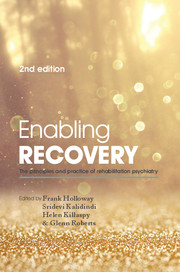Book contents
- Frontmatter
- Contents
- List of contributors
- List of figures, tables and boxes
- Preface
- Part 1 Setting the scene
- Part 2 Treatment approaches
- 7 Treatment approaches: overview
- 8 Rehabilitation at the coalface: practical approaches to helping people improve their functional skills
- 9 Cognitive approaches: cognitive–behavioural therapy and cognitive remediation therapy
- 10 Family interventions
- 11 Working with challenging behaviour
- 12 Working with coexisting substance misuse
- 13 Creative therapies and creativity
- 14 Management of medication when treatment is failing
- 15 Physical healthcare
- Part 3 Key elements of a rehabilitation service
- Part 4 Special topics in psychiatric rehabilitation
- Part 5 Future directions
- Index
10 - Family interventions
from Part 2 - Treatment approaches
Published online by Cambridge University Press: 02 January 2018
- Frontmatter
- Contents
- List of contributors
- List of figures, tables and boxes
- Preface
- Part 1 Setting the scene
- Part 2 Treatment approaches
- 7 Treatment approaches: overview
- 8 Rehabilitation at the coalface: practical approaches to helping people improve their functional skills
- 9 Cognitive approaches: cognitive–behavioural therapy and cognitive remediation therapy
- 10 Family interventions
- 11 Working with challenging behaviour
- 12 Working with coexisting substance misuse
- 13 Creative therapies and creativity
- 14 Management of medication when treatment is failing
- 15 Physical healthcare
- Part 3 Key elements of a rehabilitation service
- Part 4 Special topics in psychiatric rehabilitation
- Part 5 Future directions
- Index
Summary
Introduction
It remains one of the greatest anomalies in mental healthcare that an intervention with a robust evidence base, family intervention, has not been widely adopted in practice. The evidence for the effectiveness of family intervention for serious mental health problems has been known for over 30 years, and this approach has been consistently and repeatedly recommended in reviews, meta-analyses and guidelines (Pitschel-Walz et al, 2001; Pfammatter et al, 2006; National Institute for Health and Clinical Excellence, 2009; Dixon et al, 2010; Pharoah et al, 2010). Its effectiveness in terms of reductions in relapse and hospitalisation rates, reductions of stress for family members and reduced costs of care is highlighted in all of these.
There is now a greater recognition of the key role played by family and social networks in the recovery of those who experience mental health difficulties. However, the fact that the family is still commonly viewed as peripheral rather than core suggests that the central shift in thinking required to ensure that the importance of family, community networks, and cultural and kinship relationships is recognised has not yet taken place. In the first edition of this book, Fadden (2006a) identified factors contributing to the lack of adoption of family-based care such as lack of staff training and a perception of threat if a more collaborative model of care is adopted. As implementation issues persist, it really is time to take stock and think about what can be done to radicalise thinking, as the time lag for development to adoption of family interventions has gone well beyond the average for adopting new practices. There are various estimates of how long it takes to embed healthcare programmes into practice, ranging from 1 year (Bradley et al, 2004) to 17 years (Chaffin & Friedrich, 2004). Ensuring that service provision to families is common practice appears to be extremely complex in that it is now over 30 years since the evidence became available.
Levels of family work
One of the difficulties that clinicians and those responsible for commissioning, funding and managing services struggle with is agreeing on the range of services to make available to families so that their needs can be met in a comprehensive manner.
- Type
- Chapter
- Information
- Enabling Recovery , pp. 153 - 170Publisher: Royal College of PsychiatristsPrint publication year: 2015



